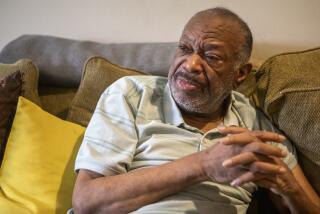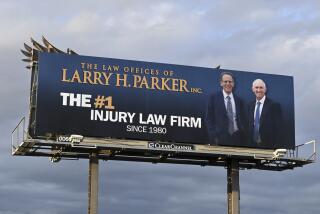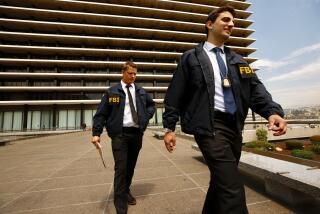Wilbur Littlefield dies at 90; trial lawyer spent four decades with L.A. County public defender’s office
Wilbur “Bill” Littlefield, a skillful trial lawyer who spent four decades with the Los Angeles County public defender’s office, including 17 years as its chief, died Saturday in Van Nuys. He was 90.
He had heart and kidney ailments, said granddaughter Christina Behle, a deputy public defender.
Littlefield, who joined the office in 1957 and became public defender in 1976, “was a good lawyer, ethical, smart but always a gentleman,” Dist. Atty. Steve Cooley said Thursday. “Unlike some out there who think … being rude or obnoxious is part of being an adversary, he was never that way. He was just an exquisite gentleman.”
Known as a strong steward of the nation’s oldest public defender’s office, Littlefield resisted the Board of Supervisors’ effort to make it take on a heavier caseload and forced the county to pay private attorneys to take up the slack.
“One of the most crucial decisions he made was to refuse to accept an excessive workload on behalf of the office,” said former public defender Michael Judge, who succeeded Littlefield in 1994. “He was a national leader in indigent criminal defense.”
Littlefield advocated strongly for his staff, even risking jail on their behalf when judges demanded what the office considered improper disclosures about indigent clients. “Rather than have one of his lawyers held in contempt, he went down to the court and would be held in contempt himself,” said former chief deputy Robert Kalunian.
Littlefield, who was born in Los Angeles on April 6, 1922, and grew up in Westwood, was drawn to the law as a boy. His father, Forrest, was the controller for a new car agency and frequently had to appear in court. Littlefield often tagged along.
After graduating from University High School, he enlisted in the Army and served in the Pacific as a leader of the Alamo Scouts, an elite, all-volunteer reconnaissance unit. Many of his exploits are recounted in Larry Alexander’s 2010 book “Shadows in the Jungle.”
Littlefield told The Times in 1993 that he decided to become a lawyer after seeing scores of Filipinos suspected as Japanese agents by their countrymen executed without a trial. “I thought that was wrong,” he said.
When the war ended, he returned to the United States and completed his bachelor’s degree at UCLA before entering UC Hastings College of the Law in San Francisco. He worked his way through law school as a longshoreman.
After earning his law degree in 1949 and passing the state bar, he entered private practice but gave it up after seven years. “They never taught me how to collect a bill in law school,” he noted wryly in a 2010 Daily News interview.
He tried for a job with the Los Angeles County counsel’s office, but the interview didn’t go well. The boss there said he didn’t drink and asked Littlefield what he thought about people who did. “I don’t think I’d ever trust anybody who wouldn’t take a drink now and then,” Littlefield told him. “The interview lasted another 30 seconds.”
He then presented himself to the public defender’s office, where he quickly gained a reputation for his courtroom knowledge and dogged representation of the downtrodden.
During the 1960s, he was particularly known for his prolific and successful defense of death penalty cases.
After he became public defender, he helped represent serial killer Kenneth Bianchi, who in 1983 was given life without parole for his role in the Hillside Strangler murders.
Littlefield did not oppose capital punishment. In fact, he once told The Times, “I feel almost universally the people that get the death penalty have earned it.”
But “if he represented anyone charged with the death penalty he would get on his knees and beg they would not be executed,” said Ken Green, who was central operations bureau chief under Littlefield.
“He was extremely devoted to the mission,” said Green, who added: “None of his clients got the death penalty.”
Littlefield’s wife, Vera Bryan, died in 1998. He is survived by two daughters, Lynn Cope and Marcia Payette; two sons, Jerry and Kevin; nine grandchildren; nine great-grandchildren; and his companion of 13 years, Marilyn Plutae.
More to Read
Start your day right
Sign up for Essential California for the L.A. Times biggest news, features and recommendations in your inbox six days a week.
You may occasionally receive promotional content from the Los Angeles Times.




















































